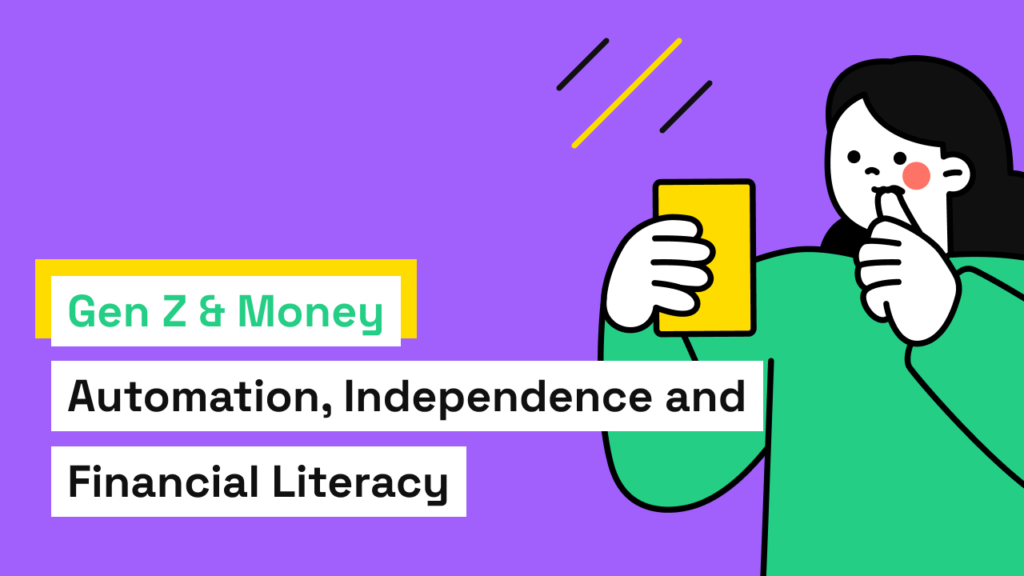Financial Literacy for Gen Z: Turn Your Dreams Into Dollars!
In today’s fast-paced, digital world, financial literacy for Gen Z has become more essential than ever. Gen Z, born roughly between the mid-1990s and early 2010s, faces unique financial challenges and opportunities that previous generations didn’t encounter. From mastering digital banking to managing student debt, a strong foundation in financial literacy for Gen Z empowers young people to make informed financial choices, set achievable goals, and build secure futures.
This Article explores every aspect of financial literacy essential for Gen Z in clear, practical terms. Whether you’re looking to budget, invest, or understand credit scores, each topic is designed to offer genuine value.

1. Understanding the Basics of Money Management
Money management is the foundation of all financial literacy. It’s about knowing where your money is coming from, how to use it effectively, and ensuring your spending doesn’t exceed your income.
Key Concepts in Money Management:
- Income: Income is any money you receive, whether from a job, freelance work, or allowances. Understanding your income means knowing your monthly or weekly “take-home” amount after taxes and other deductions.
- Expenses: Expenses are what you spend on essentials like rent, utilities, groceries, as well as non-essentials like entertainment. Categorizing your expenses can help you understand where your money is going.
- Budgeting: Budgeting is creating a plan for your money. It involves setting limits on different spending categories, so you stay within your financial means.
Building a Budget
Building a budget is like creating a map for your money. Here’s how to make one:
- Track Your Spending: Spend a week or a month tracking every expense. This will help you see where your money is going.
- Prioritize Essentials: Essentials like rent, food, and transportation should be covered first. Knowing your “must-pay” expenses will show you how much is left for non-essentials.
- Allocate Savings: Make savings a part of your budget from the beginning. Start with a goal, such as saving 10% of your income.
- Limit Spending on Wants: You don’t have to cut out all wants, but setting a specific limit will help you enjoy them without feeling financial stress.
ALSO READ: 5 Best Free Budgeting Apps For 2024
2. Embracing Digital Banking and Payment Solutions
Gen Z is the first generation that’s grown up fully immersed in digital tools, and digital banking is perfectly suited to this lifestyle. Today’s online banking apps make it easier than ever to manage money, with convenience, lower fees, and many useful features.
Why Digital Banking Matters
- Lower Fees: Digital banks often don’t have physical branches, so they save money and pass those savings on to you in the form of low or no fees.
- Easy Access: With digital banking, you can check balances, transfer money, pay bills, and track spending all from your phone.
- Built-in Budgeting: Some digital banks include budgeting features to help you track your finances directly through the app.
Choosing the Right Digital Bank
Not all digital banks are the same. When choosing one, consider factors like ATM access, customer service, fees, and features that appeal to Gen Z. For example, apps like Chime, Varo, and Revolut provide services designed for younger users, including fee-free overdraft and instant cash transfers.
3. Saving and Building an Emergency Fund
An emergency fund is a financial safety net for unexpected expenses, like medical bills or car repairs. This fund can prevent you from relying on credit cards or loans in a crisis.
How Much to Save for Emergencies
Financial experts often recommend saving enough to cover 3-6 months’ worth of living expenses. If that seems overwhelming, start small – even $500 can cover many unexpected costs and prevent financial stress.
Strategies for Building Savings
- Automate Savings: Set up an automatic transfer from your checking to your savings account each month, so you don’t even have to think about it.
- Round-Up Features: Apps like Acorns or Qapital allow you to “round up” each purchase to the nearest dollar and save the difference, building your savings gradually.
- High-Yield Savings Accounts: These accounts offer higher interest rates than standard savings accounts, allowing your money to grow faster.
ALSO READ: Save Money, Live Better: 10 Tips that act as a Blueprint for Success in Life
4. Smart Spending: Needs vs. Wants
Understanding the difference between needs and wants is crucial for maintaining a balanced budget. Needs are essentials, like food, rent, and transportation, while wants are non-essentials, like dining out and entertainment.
Tips for Managing Needs and Wants
- Create a List: Write down all your regular expenses and label each one as either a “need” or “want.” This can clarify where you might be overspending.
- Set Spending Limits for Wants: Enjoying your money is important, but limiting spending on wants ensures you don’t compromise your financial stability.
- Delay Gratification: When tempted to buy something impulsively, wait 24 hours before making the purchase. Often, the urge will pass, helping you save.
5. Building Credit Responsibly
Credit affects many aspects of life, from renting an apartment to buying a car. However, credit can also be a double-edged sword if not managed carefully.
Key Concepts of Credit
- Credit Score: This three-digit number shows your creditworthiness. Higher scores mean better interest rates on loans and more financial options.
- Credit History: Your credit history is a record of how you’ve borrowed and repaid money, which lenders review when deciding whether to approve you for loans or credit cards.
Tips for Building and Maintaining Good Credit
- Start with a Secured Credit Card: Secured credit cards, which require a deposit, are a good starting point for building credit. Keep your balances low and pay on time.
- Always Pay On Time: Late payments can damage your credit score. Set reminders or use automatic payments to avoid this.
- Keep Credit Utilization Low: Credit utilization is the percentage of available credit you’re using. Aim to keep it under 30% of your limit to maintain a healthy score.
6. Investing for the Future
Investing is a powerful way to grow wealth over time. Thanks to the magic of compounding, even small investments can grow significantly if started early.
Investment Options for Gen Z
- Stocks: Buying stocks means owning a small part of a company. Stocks have high growth potential but also come with risk.
- Index Funds and ETFs: These funds allow you to invest in a diverse collection of stocks, which reduces risk while still offering growth potential.
- Robo-Advisors: Robo-advisors, like Betterment or Wealthfront, use algorithms to manage investments based on your financial goals and risk tolerance, making it easier for beginners.
ALSO READ: How to Invest in Stock Market for Beginners in 2024?
Starting Small
You don’t need a large sum to start investing. Many platforms allow you to start with as little as $5. The key is to stay consistent and gradually build up your investments over time.
7. Managing and Minimizing Student Debt
Student loans are a major financial consideration for Gen Z, and understanding repayment options can make a big difference in long-term financial health.
Key Tips for Student Loans
- Know Your Loan Type: Federal student loans usually have lower interest rates and more flexible repayment options than private loans, so it’s essential to understand what type of loans you have.
- Income-Driven Repayment Plans: Federal student loans offer income-driven repayment plans, which base your monthly payment on your income and family size, making it easier to manage payments.
- Make Extra Payments: If possible, making extra payments on your loans can reduce the total interest you pay over time and shorten the repayment period.
8. Side Hustles and Freelancing as Income Streams
Many in Gen Z are drawn to side hustles and freelancing as a way to supplement income and gain independence. Side hustles can include anything from graphic design to dog walking, with potential for flexibility and financial growth.
Tips for Getting Started
- Identify Your Skills: Side hustles that align with your skills and interests, such as photography, tutoring, or social media management, can be both profitable and enjoyable.
- Use Freelance Platforms: Websites like Fiverr, Upwork, and TaskRabbit can connect you with clients looking for specific skills.
- Manage Taxes: Freelance income is taxable, so remember to set aside a portion of your earnings for taxes and keep detailed records.
ALSO READ: How To Make Money online Through Side Hustles For Women In 2024
9. Financial Goal Setting and Planning for Big Purchases
Setting financial goals gives direction to your money management and savings efforts. Whether it’s saving for a car, a vacation, or a down payment on a house, having specific goals can keep you motivated.
Steps to Set Financial Goals
- Define Your Goals: Write down what you want to achieve. Be as specific as possible – instead of “I want to save money,” say “I want to save $1,000 by year-end.”
- Make Your Goals SMART: Specific, Measurable, Achievable, Relevant, and Time-bound (SMART) goals give you a clearer path to reach your target.
- Track Progress: Regularly checking in on your progress keeps you motivated and helps you adjust if needed.
10. Staying Financially Informed and Adapting to Changes
Financial landscapes change rapidly, and staying informed is essential for making sound financial decisions.
How to Stay Informed
- Read Financial News: Websites like Investopedia, CNBC, and personal finance blogs provide valuable updates and insights.
- Follow Financial Influencers: Many financial experts share tips on social media platforms like Instagram, YouTube, and TikTok.
- Take Online Courses: Platforms like Coursera, Udemy, and Khan Academy offer free or low-cost courses in personal finance to deepen your knowledge.
Conclusion: Taking Charge of Your Financial Journey
Financial literacy is a journey, and every step you take builds toward a stronger, more secure future. By mastering money management, embracing digital tools, building credit, understanding debt, and investing wisely, Gen Z can achieve financial independence and confidence.
Your financial future is in your hands – start with small steps, stay informed, and watch your efforts grow into lasting financial health and freedom.




